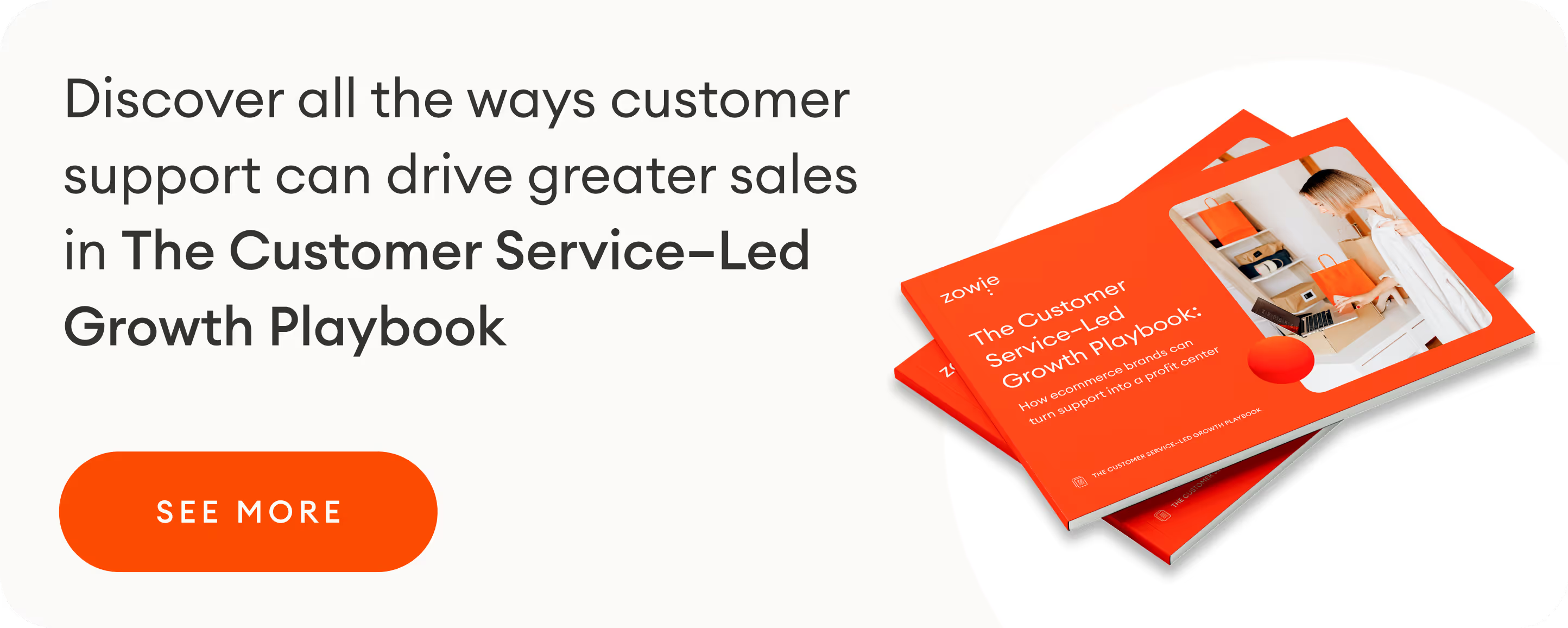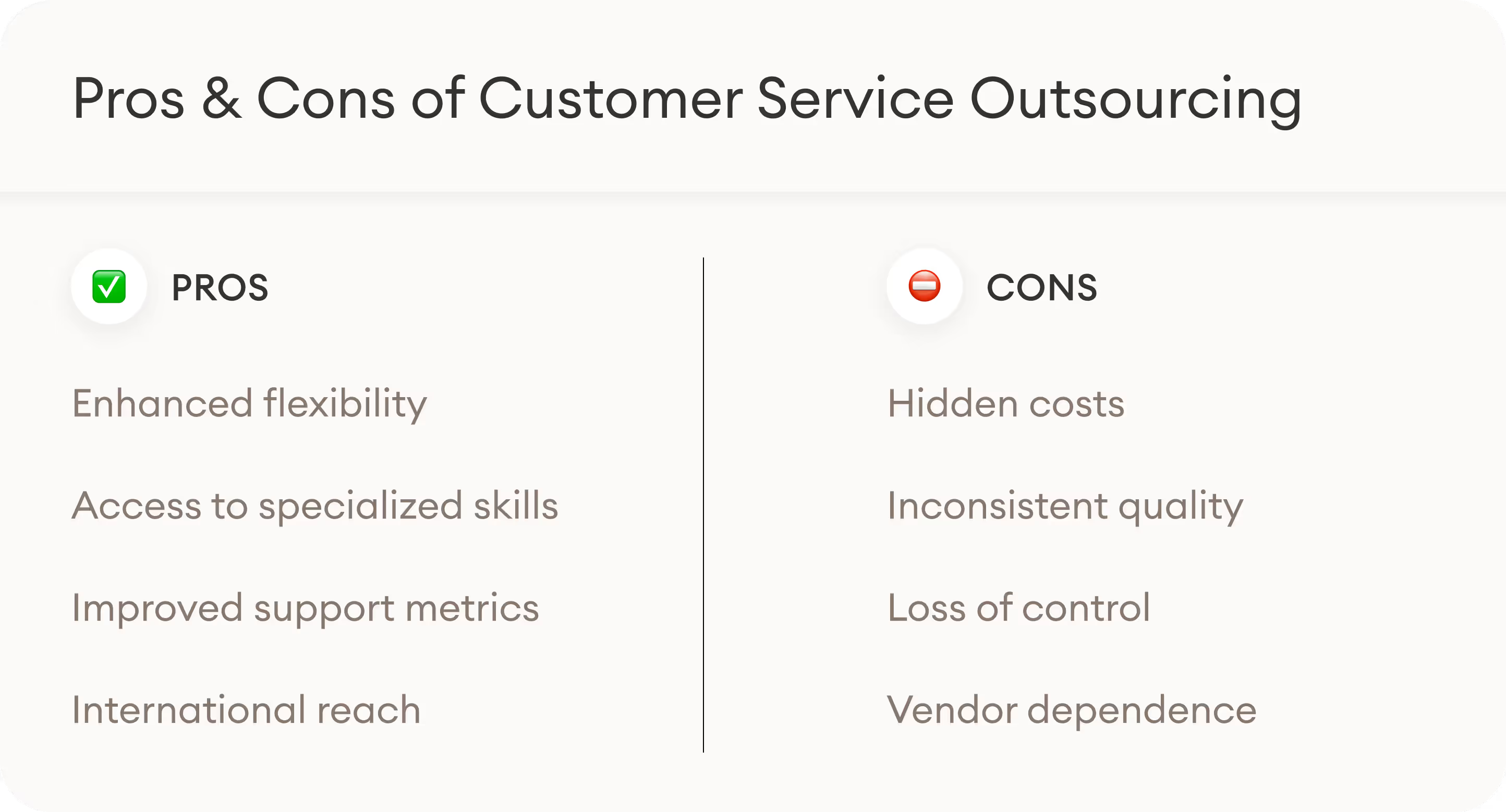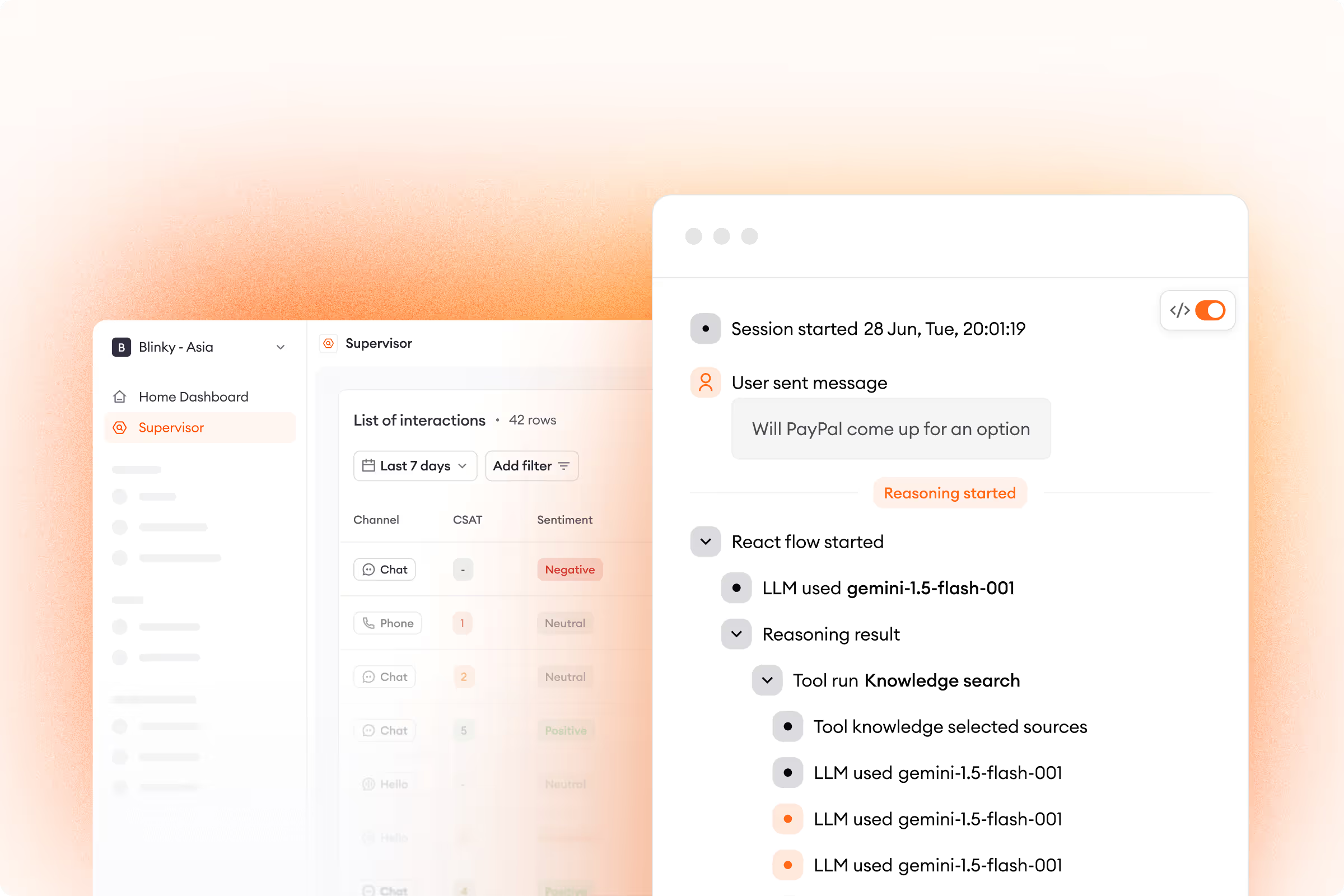Your ecommerce business is finally starting to grow. Congrats!
Quick question — have you realized expanding your customer service isn’t exactly a walk in the park? I guess they’re called growing pains for a reason.
When most small businesses begin taking on more customers, they quickly learn those shoppers ask more questions, file more support tickets, and leave more feedback. Companies that can’t scale their customer support teams to keep up with ecommerce growth risk harming the customer experience and their reputation.
Since 89% of customers switch to a rival brand after a single poor experience, delighting shoppers as your business grows is a must. Now, how can you achieve this?
Many companies choose customer service outsourcing to handle their increased chat or call volume. While outsourcing solutions work for some, they’re not guaranteed to meet all your customer service needs.
What is customer service outsourcing, and can it really help your business? Read on to learn what factors to consider before making a decision.

What is customer service outsourcing?
Customer service outsourcing involves a business delegating some or all of its customer service tasks to a third-party provider. Customers interact with an external agent, known as a business process outsourcing (BPO) partner, instead of a company’s in-house support staff.
Why do some businesses choose customer service outsourcing companies? Here are the 4 most common reasons:
1. Enhanced flexibility
Ecommerce businesses find outsourcing useful because it helps manage high ticket traffic volume. Businesses can concentrate on their core operations while outsourcing providers use their own resources to address customer needs.
2. Access to specialized skills
For newer businesses that lack robust customer support systems, outsourcing provides access to experienced customer care professionals who know how to build and grow a support team. By relying on them, companies can scale their customer service capabilities efficiently.
3. Improved support metrics
Even the best in-house customer service teams can get overwhelmed when hundreds of support tickets turn into thousands overnight. Outsourcing can significantly improve key performance indicators (KPIs) such as response times, resolution times, and customer satisfaction (CSAT) scores.
4. International reach
Outsourcing can be beneficial for ecommerce brands looking to serve a global customer base. It helps businesses offer customer support across various time zones and in multiple languages apart from English, even though hiring multilingual agents is often expensive.
Outsourcing is one way to achieve any of the above, but it’s not the only way, let alone the best. Many alternatives can improve your in-house team’s efficiency and enhance their ability to deliver scalable, personalized, and cost-effective service.

Cons of customer service outsourcing
Outsourcing is one way to achieve the benefits listed above, but it might not be the best way. Here are a few drawbacks of outsourcing:
1. Hidden costs
Companies often pursue outsourcing for cost savings, but businesses that choose this path are likely to encounter a number of hidden costs. Common fees include costs related to training and onboarding, penalties for not meeting certain benchmarks, and transitional fees whenever you need to change customer service providers.
2. Inconsistent quality
It’s often difficult for businesses to guarantee that outsourced agents are as committed and well-trained as their in-house team. An outsourced contact center usually handles customers from multiple clients, so they won’t fully know your business needs. There’s a good chance they won’t have the same level of understanding of your brand values and products as your own dedicated agents.
3. Loss of control
When you outsource, you’re handing over a major share of your customer interactions to another provider. You won’t be able to fully control the customer journey and the quality of service shoppers get. Ensuring a great customer experience also becomes challenging, meaning customers can go home frustrated and customer satisfaction (CSAT) scores can drop.
In addition, outsourcing can silence the voice of your customers — if you’re not interacting with shoppers every day, you likely won’t know what’s important to them, where they’re struggling, and what you can do to improve their experience.
4. Vendor dependence
Relying on an external company for customer service opens your business up to several risks. Any challenges your third-party provider faces can suddenly become your own. For example, if your vendor faces any issues like technical problems, data security breaches, or the mishandling of sensitive information, your customer service — and your reputation — may be adversely affected.
“With outsourced customer support, there’s always a big question surrounding quality and CSAT scores. Handling your support internally makes it easier to maintain high levels of customer satisfaction.”
-Maja Schaefer, Zowie CEO

Alternatives to customer service outsourcing
Outsourcing might give your customer support team some relief, but its benefits are frequently limited or short-lived. If you’re looking to level up your customer service for good, here are some effective alternatives to consider:
1. Self-service options
An increasing share of shoppers view speaking to a human agent — outsourced or not — as inconvenient. That’s why two-thirds of customers prefer self-service, or solving issues on their own. There are two common types of self-service companies can provide, each with its advantages over outsourcing.
Fixed self-service includes static options like an FAQ page or a knowledge base. If a fair share of your customers handle their issues with these tools, agents can see way fewer tickets. Fixed self-service not only lowers customer support costs but also lets agents resolve more complex cases quickly. Plus, customers get access to round-the-clock support, letting them find answers on topics like order status, shipping, and pricing 24/7.
The downside? Fixed self-service doesn’t offer the chance to seamlessly transition to a human agent if customers get stuck. It also isn’t personalized, making it difficult for customers to find it engaging.
Interactive self-service involves conversational tools like chatbots. It can accomplish all of the above, but chatbots are also capable of offering a fully personalized experience, boosting your bottom line, and collecting customer insights. Self-service chat support leads to engaging interactions that build customer trust and satisfaction.
Chatbots also pave the way for omnichannel support, something that outsourcing partners rarely provide. Today’s leading chatbots come with built-in integrations for the most popular communication channels, meaning customers can enjoy the same experience over SMS, social media, and so on.
2. Automated customer service tools
Automation software is a powerful alternative to outsourcing customer service because it gives ecommerce companies several benefits that outsourcing doesn’t.
For instance, one of outsourcing’s biggest drawbacks is that it requires businesses to give up control of their customer support. Automation provides team members with the same flexibility, specialization, and reach as outsourcing, but it allows companies to keep everything under their roof, maintaining their brand voice and consistently high-quality support.
And setting up and maintaining an automation solution is often just as easy, if not easier, than getting started with an outsourced team. Since leading automation software is specifically built for ecommerce, these highly specialized tools address a business’s particular needs. Chatbots, for instance, can resolve an unlimited number of customer issues at once, in multiple languages, at any time of day.
Automation takes things one step further by letting teams fully replicate knowledge of their products, customers, and processes. Your most repetitive customer inquiries are automated, while complex cases are saved for your full-time agents — those who live and breathe your brand and care about preserving customer satisfaction.
Automation’s ability to free up your team and deliver instant help doesn’t just improve the customer experience and produce higher customer loyalty — it leads to sizable cost savings. Automated self-service can reduce the cost per contact to $0.09 compared to the $14 average of assisted service.
3. AI-backed customer support agents
When powered by artificial intelligence (AI), automation solutions unlock your customer care team’s full potential, taking their efficiency to unmatched levels and allowing you to capture invaluable customer data.
AI is proven to boost customer service agent productivity by 14%. Moreover, backing your in-house customer service team with AI improves performance by streamlining data collection, chat customization, and issue resolution. Conversational AI can even slash costs big time — it’s expected to lower customer support labor costs by $80B by 2026.
Another advantage of AI is that it promotes better business decisions. By letting support teams instantly analyze customer feedback, they can spot what they’re doing well and what needs improvement. Thanks to in-depth quality assurance and feedback surveys, companies get real-time access to the voice of their customers — data that’s essential to gaining repeat shoppers and increasing customer retention.
Furthermore, AI enables teams to generate support-driven sales. AI tools can detect buying intent and proactively assist customers who are most likely to convert. Agents are also equipped to provide relevant product recommendations, becoming product specialists capable of increasing revenue independently.
So, while outsourcing might seem like an easy fix, these alternatives could offer much more bang for your buck in the long run, making your customer support something customers rave about.
Automation vs outsourcing: company spotlights
As companies grow, many are faced with the option of outsourcing vs automation. Here are two businesses that found success going with automation over outsourcing.
Giesswein scales 350% with zero new support hires

When sales for European apparel and footwear manufacturer Giesswein rapidly increased, their agents simply couldn’t keep up with the growing number of incoming tickets. Facing longer wait times, they knew action was needed to prevent a decline in their customer experience.
After opting for customer service automation from Zowie, Giesswein introduced an AI chatbot that reached an 89% automation rate in 3 months. The number of tickets requiring human intervention plummeted, and agents now have more time to dedicate to urgent customer cases. Giesswein can also now service customers in 13 languages without any pressure to increase staffing.
“Without Zowie, we would have to double the size of our customer support team to deliver the same level of service.”
-Markus Giesswein, Giesswein CEO
Media Markt enjoys company-wide benefits with AI automation

Media Markt is a market leader in consumer electronics with over 1000 retail locations. During the December holiday peak, their customer support routinely struggled to take care of the 3x surge in requests. Agents were overwhelmed, as handling tickets via phone and email proved costly, inefficient, and time-consuming.
Media Markt chose Zowie for their automation needs and saw immediate results thanks to a simple setup and a best-in-class time to value — the chatbot was fully implemented in under a month. Currently, 86% of chats are automated, and over 10,000 customer interactions are automated monthly during the winter holiday season. The AI chatbot takes on the rise in requests each December, delivering customers the instant support they’re looking for.
Media Markt handles incoming questions without a drop in quality and collects essential customer data to help them make better-informed decisions year-round.
“Holiday spikes are quite substantial for us. Our team typically goes from 80 to 200 agents each winter just to handle the increase in traffic. Thanks to Zowie, we’re confident that our customer experience won’t suffer and agents won’t be overwhelmed.”
-Maciej Woronowicz, Customer Communications Coordinator at Media Markt
Automation: an attractive alternative
Third-party customer service may seem useful at first glance, but ecommerce brands looking for efficient customer support that delights customers won’t find it in an outsourced call center.
Supporting your in-house agents with AI-powered automation is a much more effective way to enhance scalability and improve your support metrics.
Today’s top ecommerce businesses — from startups to MNCs — are choosing Zowie as their AI customer service suite. To see how Zowie can elevate your customer service operations across the board, book a demo today.
.avif)

.avif)
.svg)
.avif)






